Caroline Leavitt's Blog, page 63
March 25, 2015
Marisa de los Santos talks about The Precious One, why her dogs are in the book, and so much more
<!-- /* Font Definitions */ @font-face {font-family:"Cambria Math"; panose-1:2 4 5 3 5 4 6 3 2 4; mso-font-charset:0; mso-generic-font-family:auto; mso-font-pitch:variable; mso-font-signature:-536870145 1107305727 0 0 415 0;} @font-face {font-family:Calibri; panose-1:2 15 5 2 2 2 4 3 2 4; mso-font-charset:0; mso-generic-font-family:auto; mso-font-pitch:variable; mso-font-signature:-520092929 1073786111 9 0 415 0;} /* Style Definitions */ p.MsoNormal, li.MsoNormal, div.MsoNormal {mso-style-unhide:no; mso-style-qformat:yes; mso-style-parent:""; margin:0in; margin-bottom:.0001pt; mso-pagination:widow-orphan; font-size:10.0pt; font-family:"Times New Roman"; mso-fareast-font-family:"Times New Roman";} .MsoChpDefault {mso-style-type:export-only; mso-default-props:yes; font-family:Cambria; mso-ascii-font-family:Cambria; mso-ascii-theme-font:minor-latin; mso-fareast-font-family:"MS 明朝"; mso-fareast-theme-font:minor-fareast; mso-hansi-font-family:Cambria; mso-hansi-theme-font:minor-latin; mso-bidi-font-family:"Times New Roman"; mso-bidi-theme-font:minor-bidi;} @page WordSection1 {size:8.5in 11.0in; margin:1.0in 1.25in 1.0in 1.25in; mso-header-margin:.5in; mso-footer-margin:.5in; mso-paper-source:0;} div.WordSection1 {page:WordSection1;} </style> <br /><div class="MsoNormal"><br /><div class="separator" style="clear: both; text-align: center;"><b style="mso-bidi-font-weight: normal;"><span style="font-family: Calibri; font-size: 14.0pt; mso-bidi-font-family: Calibri; mso-bidi-font-size: 11.0pt;"><a href="http://4.bp.blogspot.com/-i5S8mbxIoXs..." imageanchor="1" style="margin-left: 1em; margin-right: 1em;"><img border="0" src="http://4.bp.blogspot.com/-i5S8mbxIoXs..." /></a></span></b></div><br /><br /><br /><br /><div class="separator" style="clear: both; text-align: center;"><b style="mso-bidi-font-weight: normal;"><span style="font-family: Calibri; font-size: 14.0pt; mso-bidi-font-family: Calibri; mso-bidi-font-size: 11.0pt;"><a href="http://4.bp.blogspot.com/-d30PDXx7_xo..." imageanchor="1" style="margin-left: 1em; margin-right: 1em;"><img border="0" src="http://4.bp.blogspot.com/-d30PDXx7_xo..." /></a></span></b></div><br /><br /><br /><i><span style="font-family: Calibri; font-size: 14.0pt; mso-bidi-font-family: Calibri; mso-bidi-font-size: 11.0pt;">Family secrets, obsessions (my middle name), and lost love. The Precious One, the latest stunner from Marisa de los Santos is already racking up raves. (Booklist, in a starred review, called it "Emotionally potent, painfully honest, and delightfully funny.") Marisa began as a poet (From The Bones Out), and is the author of the novels Love Walked in, Belong To Me and Falling Together. I'm so delighted to have her here. Thank you, Marisa!</span></i></div><div class="MsoNormal"><br /><span> </span><b><span style="font-family: Calibri; font-size: 11.0pt; mso-bidi-font-family: Calibri;">You write so beautifully about families--in all your books--that I wanted to ask you, what is it about families that is so compelling to you?<span style="mso-spacerun: yes;"> </span>And why do you think that when women write about families, it is often called “domestic drama,” but when men do it, they are Jonathan Franzen? </span></b></div><div class="MsoNormal"><br /></div><div class="MsoNormal"><span style="font-family: Calibri; font-size: 11.0pt; mso-bidi-font-family: Calibri;">Thank you, Caroline! That means the world, especially coming from you; I return the compliment over and over. You know, I think of myself as a person with a lot of interests, but nothing fascinates me as much as human interaction: conversation, touches, looks, inside jokes, what people say to each other, what they withhold, the little cruelties, the moments of wild generosity and love, the lies they tell and why. I’m particularly fascinated by the <i style="mso-bidi-font-style: normal;">why </i>of it all. And family interaction is human interaction turned to full volume. There’s so much at stake. There’s so much complicated, tangled history behind every word and gesture. People in families can be breathtakingly kind to each other and also breathtakingly awful, sometimes in the same day. In my experience, the stories that arise from these relationships are almost always strange and funny and moving and full of twists.</span></div><div class="MsoNormal"><br /></div><div class="MsoNormal"><span style="font-family: Calibri; font-size: 11.0pt; mso-bidi-font-family: Calibri;">As for the “domestic drama” thing, well, I have tried to let go of my anger about it and just write my books, but if I’m honest, it bothers me. For one thing, why should the domestic sphere, the sphere nearly all of us, female and male, spend so much of our time in, be trivialized or branded as saccharine or quiet or bland? Anyone who has lived in a neighborhood or in a family knows that as much high drama, tragedy, violence, heroism can take place inside a house as on the Australian outback or Wall Street or anywhere. And why do women always have to be seen through the lens of our gender? Why “women’s fiction” when men just write “fiction”? So maddening. So so so maddening.</span></div><div class="MsoNormal"><br /></div><div class="MsoNormal"><b><span style="font-family: Calibri; font-size: 11.0pt; mso-bidi-font-family: Calibri;">I loved that this book is told in the voices of the two sisters. How difficult was it to give each a unique voice?</span></b></div><div class="MsoNormal"><br /></div><div class="MsoNormal"><span style="font-family: Calibri; font-size: 11.0pt; mso-bidi-font-family: Calibri;">All of my books are told from multiple perspectives, but this is the first with more than one first-person voice, and I was pretty nervous about it. In the end, though, it wasn’t as hard as I thought it would be. I lived with the Taisy and Willow inside my head for a very long time—months and months—before I wrote a single word. So by the time I had to speak in their voices, I knew them both incredibly well. I knew all kinds of details about them that don’t appear in the book, the tiny things that add up to individual personality, to character, and their voices just rose naturally out of that intimacy. </span></div><div class="MsoNormal"><b><br /></b></div><div class="MsoNormal"><b><span style="font-family: Calibri; font-size: 11.0pt; mso-bidi-font-family: Calibri;">What I loved most in The Precious Ones was the dynamic between the sisters, how they misread each other, and came to reconfigure their relationship. When you started writing, what did you know about their relationship? What surprised you about it as you continued to write?</span></b></div><div class="MsoNormal"><br /></div><div class="MsoNormal"><span style="font-family: Calibri; font-size: 11.0pt; mso-bidi-font-family: Calibri;">I knew that they were strangers, that every single thing they thought they knew about each other was either something someone had told them or was a product of their own imaginations. And I knew that they were threatened by each other, Taisy because she’s lived her life wanting her father’s love and never getting it and Willow because she’s gotten so much of it that she cannot imagine a world in which she isn’t the absolute and only center of his life. What I didn’t expect was that Taisy would feel an odd and immediate tenderness toward Willow, and I don’t think Taisy expected it either! Once that happened, the surge of tender protectiveness, there was no going back from it. It was a kind of seismic shift. Yes, she was jealous and sometimes petty, but her immediate empathy for Willow caused me to shift gears and rethink all of Taisy’s behavior and emotions from that point on. It happens all the time, doesn’t it? You think you’ve got it figured out and then your characters throw you for a loop and you have to re-envision the rest of the book!</span></div><div class="MsoNormal"><br /></div><div class="MsoNormal"><b><span style="font-family: Calibri; font-size: 11.0pt; mso-bidi-font-family: Calibri;">For most writers I know, every book presents a new challenge. The writing process is almost never the same. How did that process differ for you in writing The Precious Ones?</span></b></div><div class="MsoNormal"><br /></div><div class="MsoNormal"><span style="font-family: Calibri; font-size: 11.0pt; mso-bidi-font-family: Calibri;">Fewer than 100 pages into the book, I found myself in an odd position, not so much blocked as enervated. I’d lost my joy in the process and also had sort of lost my nerve, neither of which had ever happened before. This made me crazy because I believed in the story and the characters wholeheartedly; I wanted to write the book, yet I was feeling tired and bogged down. As this was going on, my husband and I started to casually discuss what we’d write if we ever wrote a book together, just toying with the idea in our spare time, and eventually it became very clear that we had a book to write, so we put together a proposal and a couple of sample chapters, and—boom—we sold it. And suddenly, we were on a very tight deadline. Because it was a co-written book, with each of writing alternating chapters in alternating voices, and because it was a pretty complicated plot, the first thing we did was put together a highly detailed, chapter by chapter outline, something I had never tried before. Unexpectedly, I loved writing with an outline, and I had so much fun doing that book with David. I remembered all the things I had always loved about writing. Once we were finished, I went back to THE PRECIOUS ONE with renewed energy and passion <i style="mso-bidi-font-style: normal;">and </i>with my new devotion to outlining, and I wrote like a person on fire. It was a good thing, too, because I hadn’t left myself much time to finish!</span></div><div class="MsoNormal"><b><span style="font-family: Calibri; font-size: 11.0pt; mso-bidi-font-family: Calibri;"><br />What’s obsessing you now and why?</span></b></div><div class="MsoNormal"><br /></div><div class="MsoNormal"><span style="font-family: Calibri; font-size: 11.0pt; mso-bidi-font-family: Calibri;">I’m starting a new book, and it’s no exaggeration to say that I am giddy with excitement about it. It continues with some of the characters from my first two books, LOVE WALKED IN and BELONG TO ME, and particularly focuses on Clare Hobbes, who is all grown up and has just graduated from college. Cornelia, Teo, Dev, Viviana—they’re all in there—and I am cherishing being in their company again. I’d hoped for a long time that it would happen, but you just never know. Half the book is in Clare’s voice in the present, and half is set in the 1950s, so I’m just beginning to be consumed with researching that decade.</span></div><div class="MsoNormal"><br /></div><div class="MsoNormal"><b><span style="font-family: Calibri; font-size: 11.0pt; mso-bidi-font-family: Calibri;">What questions didn’t I ask that I should have?</span></b></div><div class="MsoNormal"><br /></div><div class="MsoNormal"><span style="font-family: Calibri; font-size: 11.0pt; mso-bidi-font-family: Calibri;">Here’s the big, burning, all-important question: So, Marisa, are your dogs in THE PRECIOUS ONE? </span></div><div class="MsoNormal"><br /></div><div class="MsoNormal"><span style="font-family: Calibri; font-size: 11.0pt; mso-bidi-font-family: Calibri;">Why, yes, Caroline, <i style="mso-bidi-font-style: normal;">yes they are</i>! This is my first book with dogs in it—I didn’t have dogs while I was writing the others—and while their names have been changed (from Finn and Huxley to Roo and Pidwit), they are my own sweet Yorkies, from their ears to their tick-tocking tails. People always ask if my characters are based on real people and the answer has always been no—until now. Since most of the book was written with Huxley on my lap and Finny in his little bed next to my desk, it seemed only fair to put them in the book! </span></div><div class="MsoNormal"><br /></div><div class="MsoNormal"><br /></div>
Published on March 25, 2015 09:19
March 20, 2015
Leslie Lehr talks about Wife Goes on, a joke book, and second and third acts in life!
<!-- /* Font Definitions */ @font-face {font-family:Arial; panose-1:2 11 6 4 2 2 2 2 2 4; mso-font-charset:0; mso-generic-font-family:auto; mso-font-pitch:variable; mso-font-signature:-536859905 -1073711037 9 0 511 0;} @font-face {font-family:"Courier New"; panose-1:2 7 3 9 2 2 5 2 4 4; mso-font-charset:0; mso-generic-font-family:auto; mso-font-pitch:variable; mso-font-signature:-536859905 -1073711037 9 0 511 0;} @font-face {font-family:Wingdings; panose-1:5 0 0 0 0 0 0 0 0 0; mso-font-charset:2; mso-generic-font-family:auto; mso-font-pitch:variable; mso-font-signature:0 268435456 0 0 -2147483648 0;} @font-face {font-family:"MS 明朝"; mso-font-charset:78; mso-generic-font-family:auto; mso-font-pitch:variable; mso-font-signature:-536870145 1791491579 18 0 131231 0;} @font-face {font-family:"Cambria Math"; panose-1:2 4 5 3 5 4 6 3 2 4; mso-font-charset:0; mso-generic-font-family:auto; mso-font-pitch:variable; mso-font-signature:-536870145 1107305727 0 0 415 0;} @font-face {font-family:Calibri; panose-1:2 15 5 2 2 2 4 3 2 4; mso-font-charset:0; mso-generic-font-family:auto; mso-font-pitch:variable; mso-font-signature:-520092929 1073786111 9 0 415 0;} /* Style Definitions */ p.MsoNormal, li.MsoNormal, div.MsoNormal {mso-style-unhide:no; mso-style-qformat:yes; mso-style-parent:""; margin:0in; margin-bottom:.0001pt; mso-pagination:widow-orphan; font-size:12.0pt; font-family:"Times New Roman"; mso-fareast-font-family:"MS 明朝"; mso-fareast-theme-font:minor-fareast;} p.MsoHeader, li.MsoHeader, div.MsoHeader {mso-style-priority:99; mso-style-link:"Header Char"; margin:0in; margin-bottom:.0001pt; mso-pagination:widow-orphan; tab-stops:center 3.0in right 6.0in; font-size:12.0pt; font-family:"Times New Roman"; mso-fareast-font-family:"MS 明朝"; mso-fareast-theme-font:minor-fareast;} p.MsoFooter, li.MsoFooter, div.MsoFooter {mso-style-priority:99; mso-style-link:"Footer Char"; margin:0in; margin-bottom:.0001pt; mso-pagination:widow-orphan; tab-stops:center 3.0in right 6.0in; font-size:12.0pt; font-family:"Times New Roman"; mso-fareast-font-family:"MS 明朝"; mso-fareast-theme-font:minor-fareast;} a:link, span.MsoHyperlink {mso-style-priority:99; color:blue; mso-themecolor:hyperlink; text-decoration:underline; text-underline:single;} a:visited, span.MsoHyperlinkFollowed {mso-style-noshow:yes; mso-style-priority:99; color:purple; mso-themecolor:followedhyperlink; text-decoration:underline; text-underline:single;} span.HeaderChar {mso-style-name:"Header Char"; mso-style-priority:99; mso-style-unhide:no; mso-style-locked:yes; mso-style-link:Header; mso-fareast-language:EN-US;} span.FooterChar {mso-style-name:"Footer Char"; mso-style-priority:99; mso-style-unhide:no; mso-style-locked:yes; mso-style-link:Footer; mso-fareast-language:EN-US;} .MsoChpDefault {mso-style-type:export-only; mso-default-props:yes; mso-fareast-font-family:"MS 明朝"; mso-fareast-theme-font:minor-fareast; mso-fareast-language:JA;} @page WordSection1 {size:8.5in 11.0in; margin:1.0in 128.9pt 1.0in 128.9pt; mso-header-margin:.5in; mso-footer-margin:.5in; mso-paper-source:0;} div.WordSection1 {page:WordSection1;} /* List Definitions */ @list l0 {mso-list-id:88235753; mso-list-type:hybrid; mso-list-template-ids:-709098272 67698689 67698691 67698693 67698689 67698691 67698693 67698689 67698691 67698693;} @list l0:level1 {mso-level-number-format:bullet; mso-level-text:; mso-level-tab-stop:.5in; mso-level-number-position:left; text-indent:-.25in; font-family:Symbol;} @list l0:level2 {mso-level-number-format:bullet; mso-level-text:o; mso-level-tab-stop:1.0in; mso-level-number-position:left; text-indent:-.25in; font-family:"Courier New"; mso-bidi-font-family:"Times New Roman";} @list l0:level3 {mso-level-number-format:bullet; mso-level-text:; mso-level-tab-stop:1.5in; mso-level-number-position:left; text-indent:-.25in; font-family:Wingdings;} @list l0:level4 {mso-level-number-format:bullet; mso-level-text:; mso-level-tab-stop:2.0in; mso-level-number-position:left; text-indent:-.25in; font-family:Symbol;} @list l0:level5 {mso-level-number-format:bullet; mso-level-text:o; mso-level-tab-stop:2.5in; mso-level-number-position:left; text-indent:-.25in; font-family:"Courier New"; mso-bidi-font-family:"Times New Roman";} @list l0:level6 {mso-level-number-format:bullet; mso-level-text:; mso-level-tab-stop:3.0in; mso-level-number-position:left; text-indent:-.25in; font-family:Wingdings;} @list l0:level7 {mso-level-number-format:bullet; mso-level-text:; mso-level-tab-stop:3.5in; mso-level-number-position:left; text-indent:-.25in; font-family:Symbol;} @list l0:level8 {mso-level-number-format:bullet; mso-level-text:o; mso-level-tab-stop:4.0in; mso-level-number-position:left; text-indent:-.25in; font-family:"Courier New"; mso-bidi-font-family:"Times New Roman";} @list l0:level9 {mso-level-number-format:bullet; mso-level-text:; mso-level-tab-stop:4.5in; mso-level-number-position:left; text-indent:-.25in; font-family:Wingdings;} ol {margin-bottom:0in;} ul {margin-bottom:0in;} </style> --> <div class="MsoNormal" style="background: white;"><br /></div><div class="MsoNormal" style="background: white;"><br /></div><div class="MsoNormal" style="background: white;"><br /></div><div class="MsoNormal" style="background: white;"><br /></div><div class="separator" style="clear: both; text-align: center;"><b style="mso-bidi-font-weight: normal;"><a href="http://4.bp.blogspot.com/-d6RHUYe8d2E..." imageanchor="1" style="margin-left: 1em; margin-right: 1em;"><img border="0" src="http://4.bp.blogspot.com/-d6RHUYe8d2E..." height="320" width="320" /></a></b></div><br /><div class="separator" style="clear: both; text-align: center;"><b style="mso-bidi-font-weight: normal;"><a href="http://1.bp.blogspot.com/-sJICz_R4YWQ..." imageanchor="1" style="margin-left: 1em; margin-right: 1em;"><img border="0" src="http://1.bp.blogspot.com/-sJICz_R4YWQ..." /></a></b></div><br /><div class="MsoNormal" style="background: white;"><br /></div><div class="MsoNormal" style="background: white;"><br /></div><div class="MsoNormal" style="background: white;"><br /></div><div class="MsoNormal" style="background: white;"><i><span style="mso-bidi-font-weight: normal;"><span style="color: #222222; font-family: Arial; font-size: 9.5pt; mso-fareast-font-family: "Times New Roman";"> </span></span><span style="mso-bidi-font-weight: normal;"><span style="color: #222222; font-family: Arial; font-size: 9.5pt; mso-fareast-font-family: "Times New Roman";">Leslie Lehr is not only one of the best friends anyone could hope to have, she's also a talented writer whose latest novel, Wife Goes On, now has a superb second life--with an amazing story to go along with it--and a joke book! Just take a gander at some of this praise! </span></span><span style="mso-bidi-font-weight: normal;"><span style="color: #222222; font-family: Arial; font-size: 9.5pt; mso-fareast-font-family: "Times New Roman";"></span></span></i></div><div class="MsoNormal" style="background: white;"><br /></div><div class="MsoNormal" style="background: white;"><i><span style="mso-bidi-font-weight: normal;"><span style="color: #222222; font-family: Arial; font-size: 9.5pt; mso-fareast-font-family: "Times New Roman";">WIFE GOES ON<br />"A modern mix of “Sex & the City” and First Wives Club, this is serious fiction wrapped with a chick lit bow. Lehr keeps the plot moving with madcap hijinks and tender moments." ~ Publishers Weekly</span></span></i></div><div class="MsoNormal" style="background: white;"><i><span style="mso-bidi-font-weight: normal;"><span style="color: #222222; font-family: Arial; font-size: 9.5pt; mso-fareast-font-family: "Times New Roman";"><br />"Wife Goes On is a tantalizing romp through the world of the newly divorced..." ~Hope Edelman, Motherless Mothers</span></span></i></div><div class="MsoNormal" style="background: white;"><i><span style="mso-bidi-font-weight: normal;"><span style="color: #222222; font-family: Arial; font-size: 9.5pt; mso-fareast-font-family: "Times New Roman";"><br />"Leslie Lehr has done the impossible: She's made divorce into a winning, funny and inspiring activity... Wife Goes On isn't fictionalized self-help or mundane chick-lit; it's about loving, escaping and living again… Just like real life." ~Tod Goldberg,Gangsterland</span></span></i></div><div class="MsoNormal" style="background: white;"><i><span style="mso-bidi-font-weight: normal;"><span style="color: #222222; font-family: Arial; font-size: 9.5pt; mso-fareast-font-family: "Times New Roman";"><br />"Leslie Lehr is a truth teller - a rare writer who untangles the realities of women's lives without flinching, while making you laugh, cry, and nod in understanding with every word." --Leslie Morgan Steiner ~ The Baby Chase.</span></span></i></div><div class="MsoNormal" style="background: white;"><i><span style="mso-bidi-font-weight: normal;"><span style="color: #222222; font-family: Arial; font-size: 9.5pt; mso-fareast-font-family: "Times New Roman";"></span></span></i></div><div class="MsoNormal" style="background: white;"><i><span style="mso-bidi-font-weight: normal;"><span style="color: #222222; font-family: Arial; font-size: 9.5pt; mso-fareast-font-family: "Times New Roman";"></span></span></i></div><div class="MsoNormal" style="background: white;"><i><span style="mso-bidi-font-weight: normal;"><span style="color: #222222; font-family: Arial; font-size: 9.5pt; mso-fareast-font-family: "Times New Roman";"></span></span></i></div><div class="MsoNormal" style="background: white;"><i><span style="mso-bidi-font-weight: normal;"><span style="color: #222222; font-family: Arial; font-size: 9.5pt; mso-fareast-font-family: "Times New Roman";"></span></span></i></div><div class="MsoNormal" style="background: white;"><i><span style="mso-bidi-font-weight: normal;"><span style="color: #222222; font-family: Arial; font-size: 9.5pt; mso-fareast-font-family: "Times New Roman";"></span></span></i></div><div class="MsoNormal" style="background: white;"><i><span style="mso-bidi-font-weight: normal;"><span style="color: #222222; font-family: Arial; font-size: 9.5pt; mso-fareast-font-family: "Times New Roman";"></span></span></i></div><div class="MsoNormal" style="background: white;"><i><span style="mso-bidi-font-weight: normal;"><span style="color: #222222; font-family: Arial; font-size: 9.5pt; mso-fareast-font-family: "Times New Roman";"><br />I'm thrilled to host Leslie here--the only thing better would be to sit down and have tea and pie with her!</span></span></i></div><div class="MsoNormal" style="background: white;"><b style="mso-bidi-font-weight: normal;"><span style="color: #222222; font-family: Arial; font-size: 9.5pt; mso-fareast-font-family: "Times New Roman";"><br /></span></b></div><div class="MsoNormal" style="background: white;"><br /></div><div class="MsoNormal" style="background: white;"><b style="mso-bidi-font-weight: normal;"><span style="color: #222222; font-family: Arial; font-size: 9.5pt; mso-fareast-font-family: "Times New Roman";">Tell us about what's different about the reissue of Wife Goes on--what a story!</span></b></div><div class="MsoNormal" style="background: white;"><br /></div><div class="MsoNormal" style="background: white;"><span style="color: #222222; font-family: Arial; font-size: 9.5pt; mso-fareast-font-family: "Times New Roman";">When the original book came out, I got hundreds of letters from women. They were inspired by the story and felt there really was a sisterhood, that friends had really helped them through. At the time, divorce was still shameful and the news shows were promoting divorce parties focusing on revenge. But real women had children to consider and bills to pay. Book clubs went crazy for the book, but it was a tough topic even when I met with HBO and sold a script to Lifetime. Now there’s a popular TV show about divorce – I’m a fan– but it’s about rich, skinny friends. </span></div><div class="MsoNormal" style="background: white;"><span style="color: #222222; font-family: Arial; font-size: 9.5pt; mso-fareast-font-family: "Times New Roman";"><span style="mso-spacerun: yes;"> <i> </i></span><i>Wife Goes On </i>is about complete strangers from every walk of life whose friendship makes a real difference. There’s humor and sexy stuff, too, but the characters are more diverse. </span></div><div class="MsoNormal" style="background: white;"><span style="color: #222222; font-family: Arial; font-size: 9.5pt; mso-fareast-font-family: "Times New Roman";"><span style="mso-spacerun: yes;"> </span>Also, the first edition was orphaned – my editor went on maternity leave before the magazines got copies, my agent left for a different agency – so it never liked the cover, so it didn’t get the release it needed – and I hated the cover. I finally got the rights back, so I have a sexy new cover, and as an ebook I can price it so that the women who need it most can afford to splurge on a little humor, heart and hope.<span style="mso-spacerun: yes;"> </span></span></div><div class="MsoNormal" style="background: white;"><br /></div><div class="MsoNormal" style="background: white;"><b style="mso-bidi-font-weight: normal;"><span style="color: #222222; font-family: Arial; font-size: 9.5pt; mso-fareast-font-family: "Times New Roman";">What's the free joke book like--which I think is pure genius? Can you tell us some? Did you make them up?</span></b></div><div class="MsoNormal" style="background: white;"><br /></div><div class="MsoNormal" style="background: white;"><span style="color: #222222; font-family: Arial; font-size: 9.5pt; mso-fareast-font-family: "Times New Roman";">When I went through my divorce I felt like I was joining a club I had avoided for years. It seemed horrible, and yet there were little things that were actually funny. Or, at least they made me smile again.</span><br /></div><div class="MsoNormal" style="background: white;"><span style="color: #222222; font-family: Arial; font-size: 9.5pt; mso-fareast-font-family: "Times New Roman";">I came up with 121 sayings: You Know You’re in the Club When… that told the story of how it really is being alone, with kids, with dating, with starting over. I Xeroxed pages of them and handed them out to women I met at the gym and everywhere – it was like we had a secret handshake. I saw it as a little gift book to buy at the register for yourself or a friend. But the consensus in the publishing world was that divorce was too dark of a subject for humor. With ebooks, I can afford to offer it for free, but to more people than from the trunk of my car. Why not? Women going through this are not rich like the ones on TV. And as Solomon said, ”Laughter is the best medicine.” Here are some examples:</span><br /></div><ul style="margin-top: 0in;" type="disc"><li class="MsoNormal" style="line-height: 150%; mso-list: l0 level1 lfo1; tab-stops: list .5in;"><span style="font-size: 10.0pt; line-height: 150%;">You wish you had married for money. </span></li><li class="MsoNormal" style="line-height: 150%; mso-list: l0 level1 lfo1; tab-stops: list .5in;"><span style="font-size: 10.0pt; line-height: 150%;">The man in your bed is nine years old.</span></li><li class="MsoNormal" style="line-height: 150%; mso-list: l0 level1 lfo1; tab-stops: list .5in;"><span style="font-size: 10.0pt; line-height: 150%;">You start checking for wedding rings – on women’s fingers. </span></li><li class="MsoNormal" style="line-height: 150%; mso-list: l0 level1 lfo1; tab-stops: list .5in;"><span style="font-size: 10.0pt; line-height: 150%;">You start to judge men by whether you would want to have sex with them.</span></li><li class="MsoNormal" style="line-height: 150%; mso-list: l0 level1 lfo1; tab-stops: list .5in;"><span style="font-size: 10.0pt; line-height: 150%;">The expression, “I gave him the best years of my life,” no longer sounds stupid.</span></li><li class="MsoNormal" style="line-height: 150%; mso-list: l0 level1 lfo1; tab-stops: list .5in;"><span style="font-size: 10.0pt; line-height: 150%;">You never have to cook his mother’s pot roast again.</span></li><li class="MsoNormal" style="line-height: 150%; mso-list: l0 level1 lfo1; tab-stops: list .5in;"><span style="font-size: 10.0pt; line-height: 150%;">You stop pretending to be happy and learn how to actually feel that way.</span></li></ul><div class="MsoNormal" style="background: white;"><b style="mso-bidi-font-weight: normal;"><span style="color: #222222; font-family: Arial; font-size: 9.5pt; mso-fareast-font-family: "Times New Roman";">What's your writing life like now these days?</span></b></div><div class="MsoNormal" style="background: white;"><br /></div><div class="MsoNormal" style="background: white;"><i style="mso-bidi-font-style: normal;"><span style="color: #222222; font-family: Arial; font-size: 9.5pt; mso-fareast-font-family: "Times New Roman";">Wife Goes On</span></i><span style="color: #222222; font-family: Arial; font-size: 9.5pt; mso-fareast-font-family: "Times New Roman";"> is just the beginning – I plan to revise and republish my earlier books that current readers might have missed. With ebooks, I get to control so much more – I may even change my first novel to have a happy ending. I’m also doing lots of consulting for other novelists through Truby’s Writers Studio.</span></div><div class="MsoNormal" style="background: white;"><br /></div><div class="MsoNormal" style="background: white;"><b style="mso-bidi-font-weight: normal;"><span style="color: #222222; font-family: Arial; font-size: 9.5pt; mso-fareast-font-family: "Times New Roman";">What's obsessing you now and why?</span></b></div><div class="MsoNormal" style="background: white;"><span style="color: #222222; font-family: Arial; font-size: 9.5pt; mso-fareast-font-family: "Times New Roman";">I’m happily remarried, but my husband and I had to delay getting a new home together because I got breast cancer before our first anniversary. Now that I’m better, we just bought a home together – a condo with an ocean view!<span style="mso-spacerun: yes;"> </span>So right now I’m obsessed with the idea that life ain’t easy, but we really can make our dreams can come true. We can live happier ever after.<span style="mso-spacerun: yes;"> </span>Wife goes on!</span></div><div class="MsoNormal" style="background: white;"><br /></div><div class="MsoNormal" style="background: white;"><b style="mso-bidi-font-weight: normal;"><span style="color: #222222; font-family: Arial; font-size: 9.5pt; mso-fareast-font-family: "Times New Roman";">What did I forget to ask?</span></b></div><div class="MsoNormal" style="background: white;"><span style="color: #222222; font-family: Arial; font-size: 9.5pt; mso-fareast-font-family: "Times New Roman";">The price. It’s a new release, on sale for $2.99. A few hours of fun for less than a latte. The price goes up on April 1. No foolin’.</span></div><div class="MsoNormal" style="background: white;"><br /></div><div class="MsoNormal" style="background: white;"><span style="color: #222222; font-family: Arial; font-size: 9.5pt; mso-fareast-font-family: "Times New Roman";">You can buy it from my website, </span><a href="http://www.leslielehr.com/">&... style="font-family: Arial; font-size: 9.5pt; mso-fareast-font-family: "Times New Roman";">www.leslielehr.com</span></a... style="color: #222222; font-family: Arial; font-size: 9.5pt; mso-fareast-font-family: "Times New Roman";">, or from any of the usual ebook outlets</span><span style="color: #1f497d; font-family: Calibri;"><span style="mso-field-code: " HYPERLINK \0022http\:\/\/www\.amazon\.com\/dp\/B00TKISVA4\/\0022 \\t \0022_blank\0022 ";"><u><span style="color: #1155cc;">!</span></u></span></span></div><br /><div class="MsoNormal"><br /></div><div class="MsoNormal" style="background: white;"><br /></div><div class="MsoNormal" style="background: white;"><br /></div><div class="MsoNormal"><br /></div>
Published on March 20, 2015 08:37
March 14, 2015
Because a vegan writer has to eat: Chicago Vegan Foods MARSHMALLOWS!



Ah, my second entry into Because a Vegan Writer Has To Eat.
I know, I know. I put up two photos of the vegan marshmallows, but that's not a mistake. It's because I am totally addicted to them. I wander around thinking, "Can I have two more? Or is six enough?"
Chicago Vegan Foods uses no dairy, so soy, nothing harmful to animals or humans. They also make a delicious vegan cheese called Teese, which melts like crazy, and acts and tastes just like the real thing.
And now to wax rhapsodic about the marshmallows some more...They're gluten and peanut-free, non genetically modified, and air-puffed, and they melt and create Jackson Pollack masterpieces in your hot chocolate.
Published on March 14, 2015 15:22
March 11, 2015
My rapturous mini-review of Skip Horack's masterpiece, The Other Joseph--and you get to hear Skip talk about skiffs, oil rigs, writing, and so much more
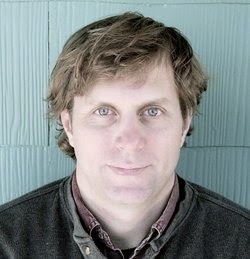
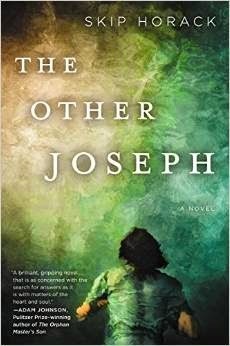
I absolutely was enthralled by this novel, The Other Joseph, by Skip Horack. I just loved it. It does what the best novels do--it makes you think about the world, and family, and legacy, differently. It changes you. About lost brothers--and lost selves--about oil rigs and Russian mail order brides, and the disconnection of love, it's one of the most masterful and haunting novels I've read all year. I'm honored to host Skip here.
He's a former Jones Lecturer at Stanford University, where he was also a Wallace Stegner Fellow. The Southern Cross, his short story collection won the Brad Loaf Writers' Conference Bakeless Fiction Prize, and his novel, The Eden Hunter was a New York Times Book Review Editors' Choice.
I always want to know what sparks a particular novel, what were you trying to discover in writing it? And what surprised you instead?
“Sparks” is a really good way to describe how it is typically some tiny flame of inspiration or interest that compels me to attack any new story or novel, as there’s usually not much more in my head going in than some small, private excitement or imagined situation. And then I get writing—and, as years pass, trying to recall what that genesis flicker might have been becomes more and more difficult for me. And that certainly applies to The Other Joseph. I know I was living in San Francisco at the time, a fish-out-water Southerner, so an exploration of that displacement was certainly an initial attraction I had. And the work of finding compelling reasons to get my main character—Roy Joseph, a somewhat reclusive Gulf of Mexico oil rig worker—from Louisiana to San Francisco led to the piece-by-piece construction of the novel’s plot. And because I work that way, without a blueprint, problem-solving as I go, dreaming up unpredictable yet believable ways to write myself out of whatever corner I’ve written myself into, there winds up being very little that doesn’t surprise me during the creation of a book.
Right from the opening pages, your novel structure is fearless. Instead of being a novel about Roy looking for his mysteriously dead brother’s daughter, it becomes a kind of circular journey, where Tommy is also searching for Roy. Both brothers are gone to each other, yet they communicate to each other. Go, they say. Speak. Tommy is actually telling Roy’s story from the journal he found, which give his brother life. How and why did you decide to structure the novel like this?
The decision to bookend Roy’s narrative with a foreword and afterword from Tommy came very, very late in the game. In previous drafts, Tommy was a completely absent character remembered only in flashbacks—a revered ghost who haunted the novel, basically. And I suppose in the end I just couldn’t resist the urge to give him a voice . . . and also to let him speak on how much Roy meant to him. Originally, Roy—kid brother to lost Navy SEAL hero Tommy—was solidly the “other” Joseph in my eyes, stature-wise, but then I came to realize that the manuscript I’d written was as much of a tribute to him as it was to Tommy. So it is with brothers, and by adding those aforementioned Tommy sections I hope I was able to help drive that idea home some.
So many of the details, especially about oil rigs, are so vivid. What was your research like?
I really enjoy the research aspect of fiction writing, and plenty of that was necessary for this book. Particularly with regard to the oil industry and military features of the novel. Being from south Louisiana, I have a pretty good, albeit mostly superficial, knowledge of the former—but I also have quite a few friends and contacts with much more direct ties to that world, so I was sure to lean on them. As for the novel’s military aspects, I’m fortunate to have a retired (and patient) Navy SEAL cousin who spent more time answering my questions and steering me straight than I had any right to ask of him. And then there was all the traveling and wandering necessary to create an authentic and memorable sense of place, visiting and revisiting the novel’s various settings as I attempted to view them through the lens of my narrative. Finally, of course: so many books, articles, etc., and so many websites. What a gift that us fiction writers don’t have to keep tabs for a bibliography.
What I so deeply admire about this novel is the way that grief soaks every page, but so does hope, and the power of imagination. The truths we expect are not the ones we are given, and nothing is like it appears. We are all haunted, but perhaps, just for a moment, a light can be turned on in the darkness. So much is lost in this extraordinary novel, but there are glints of things that might be found. Can you talk more about this please?
Wow, I just want to keep reading the question! I really appreciate those kind words, here and throughout, and I’d love to think that—despite the sad and tragic aspects of the novel—readers won’t read The Other Joseph as pessimistic or nihilistic in its worldview. To quote one of the characters in the book: “Triumph without struggle means nothing.” And regardless of outcome, I’ve always seen much to celebrate in the way our ability to hope, and even the power of our imaginations, can help us fight that fight.
I always want to know about craft. What kind of writer are you? Do you plan things out or wait for that pesky muse?
As I touched on earlier, in the beginning I don’t create from an outline—though as the draft progresses I’m certainly always on the lookout for scenes or moments to write toward. Which isn’t to say that I wait around for a muse to sing me to work either . . . more like I sit down at a computer every morning and don’t let myself quit until I’ve hit whatever particular word-count goal I have for the day. The only thing I have a pretty good sense of at the outset is approximately how long I want the book to be, as anticipating that helps me with the plotting and pacing of things. And as always when I’m speaking of my process, please note that this is just how I do things. I know many good writers who work very, very differently.
What’s obsessing you now and why?
I bought a little skiff not so long ago, nothing special, but as spring arrives in northern Florida I’ve been having a ball exploring all the rivers around here. Waters have always captured my imagination—that’s pretty obvious from the novel, actually—and after several years of being boat-less it’s been fantastic getting to pour over maps and scratch that itch again. What question didn’t I ask that I should have?
First off, thank you for all of these questions. I’m such an admirer of your work, so it means so much to me that you enjoyed the book. Now, I can’t think of a question you should have asked—but I’d love to suggest that you check out a debut story collection by a friend of mine: Molly Antopol’s The UnAmericans. When I read her book last year I was reminded quite a bit of your wonderful novel Is This Tomorrow, so I definitely recommend her to you and your fans.
Published on March 11, 2015 12:43
Marcia DeSanctis talks about 100 Places in France Every Woman Should Go
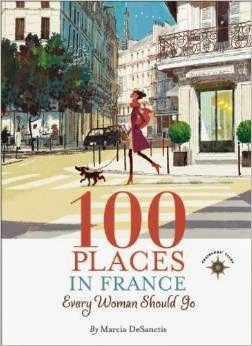

Put together the words France and "100 places" and I am ready to buy my plane ticket instantly. Marcia DeSanctis is the New York Times bestselling author of 100 PLACES IN FRANCE EVERY WOMAN SHOULD GO (Travelers’ Tales/Solas House). She is a former television news producer who has worked for Barbara Walters, ABC, CBS, and NBC News. An award-winning writer, her work has appeared in numerous publications including Vogue, Marie Claire, Town & Country, O the Oprah Magazine, National Geographic Traveler, More, Tin House, and The New York Times. Her travel essays have been widely anthologized, including four consecutive years in Best Woman’s Travel Writing, and she is the recipient of three Lowell Thomas Awards for excellence in travel journalism, as well as a Solas Award for best travel writing.And her book, is wonderful. I asked her if she'd write something for the blog, and I'm honored to host her here. Thank you. Marcia!
My book has the title of a guidebook, but it’s not that, not exactly. The New York Times described it as “essays on where to go in France and why”. That was accurate. It’s a book of essays and reported stories about place with quite a bit of travel advice mixed in. I had to choose 100 places (or in some cases, experiences) about which I could do some deep writing, and hopefully, in the spirit of France, do it with a light hand, that integrates history with lots of descriptive detail about beautiful things. What I chose to include had to fit one of several criteria. First, is there a story of a great woman in history around which I could build the piece? An example of that is the chapter on Château de Grignan, a place that is interlocked in the history of Madame de Sevigné, one of France’s great writers and most famous mothers, who has a pretty remarkable story herself. Second, is it something so beautiful that it causes our hearts to stop? The chapter on three stunning hikes in Provence is an example of this, as is Château Vaux le Vicomte. Etretat in Normandy. The Mer de Glace in Chamonix, which, by the way, is what inspired the climax of Mary Shelley’s Frankenstein. Third, is it a place where I have deep personal history, such as St. Tropez, from which I can cull memories and use as a bridge across time? And is also deeply, poetically, femininely French? Fourth, is it en experience so iconic that it had to be included – something like sampling chocolate in the Basque Country or celebrating Bastille Day on the Champs Elysées?
This book was an opportunity for me to crystallize lots of profound feelings for a country I know very well, a country that changed me. To try to express the transformative powers of France. To put down on paper, in effect, all that I loved in France’s geographical and historical diversity, while trying to impart some wisdom and bon mots about traveling there. Not just where to shop in Paris, but why. Not just my recommendation to snorkel on Porquerolles, but why. Not just to visit Versaille, but why. Versailles is not merely an extraordinary excursion from Paris. Rather, it is a place to understand why Marie Antoinette continues to fascinate us. It has little to do with her diamonds and wigs, and more to do with her story, on royalty and birthright. These are big, big themes – female ones – about marriage, family, aging, selflessness and selfishness, and we are confronted with them at Versailles. Everything in travel can conspire to enlighten -– the architecture of devotion, the majesty of green spaces. I try to convey my awe wile sparing the details of how to get there, and where to eat. I try to say, here is the bigger story. Sure you should go to that pretty lighthouse off the coast of Brittany. But when you’re there, try to decipher the metaphoric possibilities of a giant structure whose purpose is to help mortals weather storms. They are overpowering.
Most inspiring was the country’s rich history of powerful, brilliant women, and I enjoyed having the chance to unpack some thoughts about why we should care about them and the places where their memories are kept vital and vibrant. Catherine de Medicis, Joan of Arc, Colette, whose book Earthly Paradise was my go-to inspiration while writing this book. As was Edith Wharton’s A Motor Flight Through France. George Sand – the bored housewife turned rockstar romantic writer and lover of Chipin. The painter Elisabeth Vigée le Brun, poet Louise Labé, Marie Curie. These women are giants. Eleanor of Aquitaine. There was never a woman with her stature and power, and there probably never will be. Much to my surprise, it’s possible to feel amazingly close to a long-departed queen when you are standing in her castle.
I was also motivated by the challenge of trying to create a sort of hybrid travel writing genre. France as a subject that has been covered to smithereens, so my challenge was to have an entirely different take. To take the country I lived in, worked in, was married in and which I love, and try to combine memoir and narrative with advice, and hopefully, to carry the reader along with me on this journey. My goal was not to overemphasize the girly tropes of champagne and perfume and fashion. I really attempted to forge some fresh language (in fact, tacked up on my wall, I kept a running list of words and expressions I wanted to avoid. No to “hidden gem”, “verdant”, “ooh la la” and “city of light” or “golden”). I was quite inspired by this quest: to convey my love for France and even its inescapable clichés and to do so in a respectful and hopefully original way.
Published on March 11, 2015 12:29
Come on, how can you resist a title like THE REAL DOCTOR WILL SEE YOU SHORTLY: A PHYSICIAN'S FIRST YEAR? Matt McCarthy talks about writing, doctoring, and how he checks his email way too often
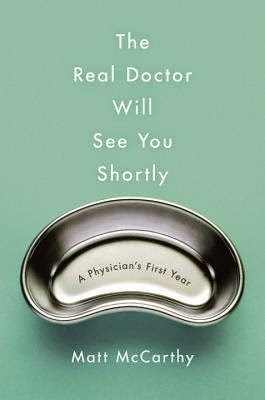

I found this book absolutely irresistible. Brave, funny, and full of truths, The Real Doctor Will see You Shortly, offers an insider's look at what it means to be a doctor. Matt McCarthy is an assistant professor of medicine at Weill Cornell Medical College and an assistant attending physician at New York-Presbyterian Hospital. He has a degree in molecular biophysics and biochemistry from Yale and a medical degree from Harvard. His work has appeared in Sports Illustrated, Slate, The New England Journal of Medicine, and Deadspin, where he writes the Medspin column. His first book, Odd Man Out, was a New York Times bestseller. Thank you for being here, Matt!
I'm always interested in what made you decide to write this book at the particular time that you did? What was the spark?
I was having dinner with my editor three years ago and he said, “Have you thought of writing a book about medicine?” It wasn’t something I’d been thinking about, but the next day I went for a walk with my wife in Central Park and we started talking about why we don’t enjoy medical books, despite the fact that we’re both doctors. The short answer is that it’s not easy to write about a job that can make you so frustrated without sounding like a bit of a jerk.
The book is so brave, so candid, and so funny. What surprised you in the writing?
Thank you. The big surprise came when I read the completed manuscript for the first time. There’s a shift in tone that occurs between parts 1 and 2 that I wasn’t expecting, and another shift between parts 3 and 4. When I put the manuscript down, my first thought was of the Radiohead song “Paranoid Android” which has four distinct parts that are played in different keys and with different tempo. Somehow that song holds together beautifully. I wondered if my tonal shifts would hold together, or if readers would find them jarring. I also thought paranoid android was an apt description of how I felt as a first-year doctor.
You talk about having had a mentor who helped you move from scared young doctor to seasoned pro?
Most people are familiar with a hierarchy in medicine, but they don’t know that first-year doctors learn almost everything from second-year doctors, not from the senior physicians. I was fortunate to train at a place—Columbia University Medical Center—that had a number of brilliant, funny, talented young doctors to show me the ropes. I will remember what I learned from them for the rest of my career.
When your own health fell apart, you began to see being a doctor from the viewpoint of a patient. What do you think more doctors should be aware of when they treat patients? And what do you think patients should be more aware of when it comes to their doctors?
Doctors don’t realize how often they use medical jargon that confuses people. We have to remember that medicine is a foreign language, and it’s important to simplify things in a way that doesn’t oversimplify. I get very worried when a patient is quiet for more than fifteen seconds, because it usually means they’re not following what I’m saying. It’s kind of like being on a date: if one person is doing all of the talking, something’s wrong.
Patients should be aware that we want you to speak up if you’re confused, and we won’t take it personally if you want a second opinion.
How do you see the medical profession changing?
I’m concerned that morale in medicine is low. Almost every doctor I know is a good person who cares deeply about patients, yet there’s an endless stream of stories written about what’s wrong with medicine and the people who practice it. There just seems to be less incentive to become a doctor than there was ten or twenty years ago. My guess is that more of the top minds will go into other, more lucrative fields—consulting, finance, etc.—instead of medicine. Students at my school, Harvard Med, spend more than $80,000 on tuition and living expenses. And that’s just for the first year.
What's obsessing you now and why?
As an intern, I spent a lot of time obsessing about my patients and not screwing up. Turns out that feeling never goes away.
What question didn't I ask that I should have?
You’d have no way of knowing this, but for one week during my intern year, my wife was my direct supervisor. At the end of the week, we were required to give each other feedback. I told her that she was great to work with and she told me I check my email too much. I do.
Published on March 11, 2015 12:24
Jen Grow talks about MY LIFE AS A MERMAID AND OTHER STORIES, being obsessed with her relationship with a homeless guy, writing, and so much more
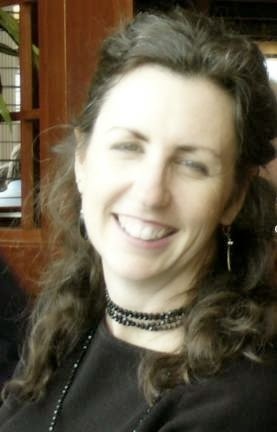
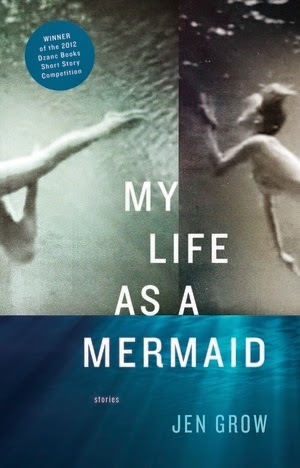
What's more exciting than a new exciting of short stories? Jen Grow is the fiction editor of Little Patuxent Review. Her writings have appeared in The Writer’s Chronicle, Other Voices, The Sun Magazine, Indiana Review and many others including the anthology City Sages: Baltimore. She’s received two Individual Artist Award from Maryland State Arts. My Life As a Mermaid (great title, right?) is about what really lives under the seams of "happily ever after" and it's just plain brilliant. Thank you so much, Jen, for being here.
Now that you won the prestigious Dzanc prize (congratulations and so, so deserved!), what’s the impact on your new work?
Thanks, Caroline. The award has invigorated my writing and encouraged me to return to fiction. I’ve been writing nonfiction recently, finishing up a memoir and writing some personal essays about the death of my father. This award has given me the incentive to pick up my novel draft, dust it off, and revise. It’s also sparked a few new stories and has got me thinking about the direction for another story collection.
So much is about timing. “Is it too late to smile?” one character asks. In another story, a character remarks that the neighborhood “eventually gets better, years later, but we don’t know that yet.” Do you think that those who are trapped can ever manage to turn time to their advantage?
Yes, but when you’re in it, when you’re the one who is stuck, it feels like things will never change, that time is working against you. I just read the Bob Dylan interview in AARP and he said something that struck me, “Time has to be your partner… time is your soul mate." I think it’s an ongoing dance to learn how to make friends with time and get it to work for you. I get stuck from time to time, as we all do. A situation will come along and knock me off course for a little while. I get things I don’t want or fail to get things I want. There is a recalibration period that varies from situation to situation, from person to person. But there’s always something else coming, another idea, another mood, another insight. For me, being trapped is less about time and more a matter of perspective. The amount of time it takes to become unstuck is in proportion to how slowly or quickly I can shift my perspective. Of course, if you can’t make that shift, then you do stay trapped. So, yes, it’s possible to turn time to your advantage, but it’s not a given.
A lot of the stories have to do with water, which fascinated me. Even the cover, which is beautiful, shows two bodies under water. There’s that sense of floating through life, and not really being a part of it--at least for me. Could you comment?
I really like to swim. I turn into an eight year old kid when I’m near a body of water. Even now, forty years later, I still do this weird thing where I sort of plop headfirst into the pool so I can feel disoriented for a few seconds. I do it on the sly now, because let’s face it, I’m a middle-aged woman and it’s embarrassing when kids and adults ask me if I’m trying to teach myself to dive. And also, I swim where Michael Phelps and other Olympic athletes train. The pool is full of serious, vigorous swimmers, and then there’s me on the side, doing my head-plop into the water. Just so I can get dizzy and momentarily separate myself from the world. The muffling effect of water is such a great thing! That says way more about me than I probably should admit, but you’re right about my characters floating through life without being a part of it. That’s me, to some degree, a fish trying to describe water. Monet’s impressionism, I’ve heard, was born partially out of his nearsightedness. Maybe my writing is the same: I have blurry, aquatic vision and so I describe the world as I see it.
I really want to ask you about how you write, since these stories are all so brilliantly crafted. What sparks a story for you? How do you write? Do you have rituals? Do you outline?
My favorite part of writing is revision. Each pass through a story takes me deeper and deeper to mine for the rubies. That’s on the good days. Other days, I compare my process to sculpting. Years ago, I used to be a figure model in art classes, and I’d watch the students build clay sculptures on armatures. For hours, they’d add and subtract clay, sometimes to the same spot. They’d shave a little off, then re-add it, smooth it over, and then shave it off again. That that’s how I write. I start small, with just the bones, and build up. I go over each line again and again. Moving a word, putting it back. I’m a slow writer because of it, and perhaps and an obsessive writer, but that’s how it works for me.
Sometimes I wish I could outline my stories. Maybe I’d be a faster writer that way, able to produce, produce, produce! But my stories are intuitive constructions. I don’t always recognize the patterns and connections that my mind is creating. An early reader for my story “Camera Obscura: Light Seeps In” asked me, “What’s with all the underwear? You’ve got all these characters running around in their underwear.” I didn’t even see it. It wasn’t intentional, but it was right. I needed the characters to be exposed and vulnerable at an emotional level.
Also, I try to write a little bit everyday, even if it’s just ten minutes before I go to bed, even if it’s just to change one sentence. It keeps the piece alive in my head. These daily increments are punctuated by binge weekends where I go away and write for ten hours a day for a couple of days in a row. I actually prefer binge writing and would do it all the time if I could sustain it, but there’s always the rest of life that needs attention. The dogs need to be walked and somebody has to cook dinner.
What’s obsessing you now and why?
I’m afraid you’ve opened the floodgates with that question.
First, I want to finish my memoir. That’s definitely an obsession. I’ve been working on it for five years and I feel a need to be done with it. But the more I try to finish it quickly (I’ve officially finished it five times already) the more I realize that rushing doesn’t serve me well.
Also, I’ve been fascinated by the grief process. Unfortunately, it’s developed into a terrible knack for cornering friends at literary events and talking about the difficulty of losing parents and cleaning out their homes. I can’t stop myself. It’s like I have Tourette’s and keep blurting out the word ‘death’ at inappropriate times. I had to promise one friend that, next time, I’d talk about dogs instead.
I’m also obsessed by a homeless guy in my neighborhood named Danny. Danny used to live in a wooden shed behind a neighbor’s house, but he got mad at the neighbor and is now living in the woods in a tent. Actually two tents, one inside the other, covered by a tarp, surrounded by a wind proof fence, dug into the side of a hill. My husband and I have offered to let him stay in our basement when the weather is bitter cold or it’s snowing, but Danny doesn’t want to leave his cats, which I completely understand. (And since we’ve got two dogs and two cats of our own, we can’t accommodate three or four more animals.) Other people have invited him and his cats inside, but he doesn’t want to move. He’s stubborn but also resourceful, a hard-working, helpful guy who knows everything that’s going on in the neighborhood. So all of us, even the police, are looking out for him. We gave him kerosene and candles for Christmas. He gave me a bracelet that he found. There’s more to this that I need to write.
And West Virginia has been calling me. I read this beautiful and important book by Erik Reece called Lost Mountain about mountaintop removal. That has inspired me to set a novel or some stories in the coal country of West Virginia. Lost Mountain, the actual mountain, is in Kentucky, but since I’ve spent more time backpacking in West Virginia, I’m drawn to it as a setting. Now, of course, the decimation of mountaintop removal is coming to other communities across the country in the form of fracking. And that’s led me to think a lot about energy consumption, erosion, consumerism, mass extinction, elephants dying—you know, really light-hearted stuff.
What question didn’t I ask that I should have?
How about this: What’s the most surprising thing this book taught you about yourself? I was completely surprised to realize how I’d been drawn into the national conversation on social justice and equality while I was writing these stories. I had no idea I was writing about voiceless characters. Then a pattern emerged (like when my friend said, “What’s with all the underwear?”) and I couldn’t deny it. That’s the mermaid, right? On dry land, without a voice.
Published on March 11, 2015 12:18
George Hodgman talks about his life with his aging mother, love, NYC, writing, and so much more BETTYVILLE
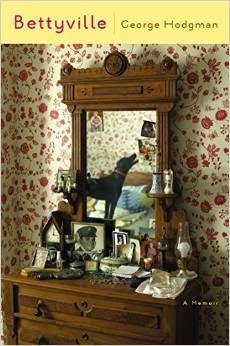
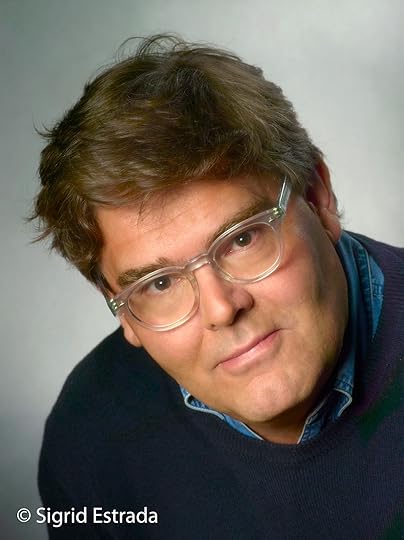
My mom is 98 and has dementia, so George Hodgman's astonishingly warm and moving memoir, BETTYVILLE, was a must-read for me. He's a veteran magazine and book editor who has worked at Simon & Schuster, Vanity Fair, and Talk magazine. His writing has appeared in Entertainment Weekly, Interview, W, and Harper’s Bazaar, among other publications. He lives in New York City and Paris, Missouri. Thank you, thank you George!
There is something so exquisitely funny about a NYC cultured gay man going to care for his aging mother in a small town in Missouri, and although this book is sublimely humorous, what caught me the most is how moving it is, how profound. Did this surprise you when you were writing the book?
I loved my parents; they have truly been my favorite people. I’ve spent my life fearing the time when we would have to say goodbye. I lost my father in 1997. Since then, my mother and I have grown closer in many ways and I have dreaded what I knew was coming, the loss of her. The thing is this—her dementia, her cancer, her decline, all of it is hard, but it is also a journey that we are sharing. I watch her struggle, with a lot of courage, through this hard chapter and there are horrible days, depressing days, but there is also a lot of humor and tenderness. Watching it has changed me, made me more human, not necessarily happier, but deeper. At the place where she goes for radiation treatments for her cancer, I hear people talk about “the journey.” The term is correct; it is profound to walk through this with someone. It’s a surprise only because this ending is something I never wanted to think about or dwell on. I wasn’t prepared for how full this experience was going to be. These days, these years, it’s like they are a different color than the rest of my life and I’ll never go back to quite the same shade. Without my mother, the world will become less familiar. Part of the journey of being human is dealing with all this change.
I think what moved me the most were the questions about how do we handle the end of life? And how do we help our loved ones through it? These surely must be questions you think about for yourself. Do you have advice for anyone who doesn’t have family and who is facing aging on his or her own?
I think about that a lot. I think about how I want to spend the last part of my life. I believe it is really important to have a community or communities, whether one has a conventional family or not. I want to be part of something. You have to give to others in some way for as long as you can. I think that finding people to share your deep human experience with is the most important thing. Helping and accepting help make life more meaningful.
I have to ask about your experience with Madonna, since you so wittily said people would have to ask you privately about that, and I never follow directions.
I worked with her on the diaries she wrote for Vanity Fair when she was filming Evita and found herself pregnant. Getting her to agree to the business aspects of it—the length of the piece, especially—was rugged. She wanted everything she could get in terms of the deal and the way the piece was handled. After all that, the negotiation was settled, she was the complete professional, but very guarded. My little dream of becoming her friend was not going to come true, but I liked her a lot. She was surprising in certain ways—like not wanting to keep me up too late at night when her schedule created the need for crazy hours. She seemed like someone I might have gone to high school with, an ordinary person who demanded a huge amount of herself, but who was finally really vulnerable and maybe, in her heart, a bit lonely.
So much of your book is really about kindness, the little things we can do for people that will mean everything to them. Some might say it was a huge sacrifice for you to leave NYC and tend to your aging, feisty mother, but in your book, it becomes a kind of blessing for both of you. Would you talk about that a little, please?
It’s been a gift, to have a little more of home, to create a space together at this moment—Betty, me, Carol who helps us, my cousin, and our dog. It’s a family and, after going it alone through a lot of stuff in New York, it has been lovely to come back to this place and renew my relationship with this place. It has been a huge comfort to discover that I still have a place here, that I still have a home in this town, that the kind of harsh judgments I anticipated as a kid growing up different here are rare. I’ve found this domestic side of me. I’ve learned to cook, to tend the flowers, take care of someone. It has been a blessing. When I left New York, I had lost my regular job. I was freelancing and just hated being in my apartment alone all day. There is this sound that empty building have during the day. Here, it’s busy; there’s always something, but I’ve grown from the necessity of taking charge and getting through things that I never thought I could. I mean, my approach to daily life has been pretty cursory. I’ve usually managed to do my taxes but never had any idea of whether I had any money in my checking account. I’ve been forced to grow up, father her in a way. But your word “blessing” is correct. There is a quote I remember in a novel by Mark Salzman called Lying Awake: “Suffering as shared by two is nearly joy.” No way can dementia or cancer be considered joy, but there’s truth in his sentiment.
I find it totally remarkable that you are still staying with your mother, who now has cancer on top of dementia. You mentioned in an interview that there is a possibility that “you will decline along with your parent.” How do you deal with how anger affects you about your mother’s aging, about suddenly becoming her parent, something that surely is uncomfortable for both parties?
Everything happens minute by minute, a day at a time. I don’t think too far ahead. I just try and get through the next thing. I try to make the best choice I can when each decision or problem presents itself. The anger is rare, but it comes. Recently she has not been eating, won’t try to eat. This just drives me nuts. I don’t know what to do about that. But mainly I’ve settled into the role. I don’t get out much. I don’t have a lot of people to socialize with. But I have the early mornings as I’m a very early riser and she doesn’t get up until later. And I have the late nights as she goes to bed at 9. That time is kind of crucial. I read. I binge watch The Wire or some crime show. These hours are special and the house is quiet and really late at night in a small town in the winter, you feel comfortably alone and tucked in, cozy and safe. Wherever and whatever you’re doing you have to find the beautiful moments. Betty gives me those. Mainly she makes me laugh. She recently read this book called The Secret Conversations of Ava Gardner and she thought it was very risqué. “This is the filthiest book I’ve ever read,” she told me, “you ought to read it.” For weeks she spoke about Ava and Frank Sinatra as if they lived here in the house with us. Reading, which she never did much before, at least beyond the newspaper has been a great gift in these years in terms of providing entertainment and helping her mind. You have to find the little pleasures you can give them and take satisfaction from that. Also, it’s not like I’m the first person who’s ever gone through this. Zillions of people are taking care of people, a fact that seems to have escaped me earlier in my life. I really get a lot of good examples from others. A trip to the doctor’s office or to the cancer center….You see these people and their hopes and losses and every day there is something human and you want to celebrate these other people. It’s taken me out of myself a bit and boy did I need that.
What I loved so much about your memoir, besides the richness of the writing, is the wry humor, and the depth of your love. What was it like writing this? Was there ever a moment when you wanted to rewrite the story of your life and your mother’s, or did you feel peace that things worked out just the way they did?
I’ve never wanted a different childhood or different parents, really. I mean, when I was a kid I used to dream about growing up in New York or L.A., having a more glamorous life, but there has been a basic contentment about what I have been given and I’ve grown more and more grateful as I’ve seen the world that I’ve had what I’ve had. I’m proud of my struggles and my battles. I want to wear my scars well. The pains have given me depth. I don’t want to rewrite. Maybe I’d add a few chapters, some vignettes and anecdotes, more youth, more beaches, fewer humiliating mistakes. There is certainly stuff I wish I could have avoided, but I feel like I am negotiating the journey that I’ve been given here.
You write about fearing intimacy and yet you have the most movingly intimate relationship with Betty. Has that changed the way you deal with other people?
I guess we’ll see. It’s certainly changed my values. I don’t want to go back to living as I did, but it’s subtle. I’ve not had, you know, the big, expected intimacy with the great, long-lasting love or whatever, but I’ve had a lot of surprising, unconventional times of great connection with people, things that are hard to articulate but significant to me. I imagine that will be the way it will continue to be, but I do think that I have outgrown a lot of insecurities that have made intimacy harder. I’m just more real, more frank and that makes connections.
You write movingly about what it was like to be a young, confused gay kid who could not discuss your sexuality with your parents. In a way, you were in a lonely country the same way your mother Betty is now. But knowing what you know now about your mother--and yourself--do you think if you had told them, they would have accepted it?
I love your phrase, “a lonely country.” I was lonely, longing for a certain kind of experience and understanding as a kid and I guess all my life, but I also have had a lot of people around me who I have been really happy to be with. Great friends. I think my relationships with my parents were really satisfying; I wouldn’t trade them. I wish that we could have communicated about things more openly, but I’m learning from conversations with people who have read the book that you don’t have to be gay to keep parts of yourself secret from your parents. I wish I had more faith in my mother, that I would have shared more personal things with her and I feel bad about that, but she kind of set the example, you know, she didn’t tell me how she was feeling or what was going on inside her, but I never for a second doubted the love. I can’t gauge what might have been. Everyone’s reality has light and dark, everyone’s relationships have great satisfactions and some problems. No connection is perfect. If we had been more honest about the gay thing, we probably would have found something else to have trouble with. That’s life, that’s reality. But I think that one of the things that the book is trying to say is that a family doesn’t have to be perfect to be a family and to provide lasting foundation. Perfect people sound pretty boring. I certainly would not want to move in with the Brady Bunch.
How is Betty now and will you say hello to her from me?
Yes I will, we’re having some struggles now. It’s been a very hard winter on many fronts for Betty. I don’t know what will happen. I don’t know if I will be able to keep her at home, but I certainly won’t put her in some kind of facility and go back to New York. I’ll be with her as long as she’s here and I’ll be happy to be here.
What’s obsessing you now and why? What question didn’t I ask that I should have?
I’m always obsessed with what I’m reading or seeing—a book or poem, a painting, a movie, or whatever. I am passionate about participating in and enjoying what people have created. That’s all magical and even spiritual to me. At this point in my life, I would rather be a participant, a maker, rather than just a consumer, so I’m obsessed with finding a new project, with continuing to write and to try and improve in this arena. I want to be a writer. I want to get better at it. I want to be an old man writing in my house late at night with my dog and the snow falling down or the crickets buzzing, sneaking out to the garage for a cigarette. I’m not the most religious person in the world, not conventionally, but I am a believer in the God I have discovered along the way, the force that has been gradually revealed and felt. I pray a lot. All through this book, I prayed to tell a human story. I don’t like big things—wars, for example. I like the daily struggles. I would just be so grateful to get to do this again, to be able to overcome fear and try again to make something.
I’m not aware of a question that you have avoided, but I want to make this point: I don’t think I’m unique. It’s not remarkable to try to take care of someone. Most people do it at one time or another. My story is unique only because of the people it involves and their individual personalities and struggles. I would like the book to celebrate my mother’s courage and her resilience, these gifts that she has given me. I’m not the giver here, really. I’m the recipient and I think that maybe the book is about discovering what it is we find in participating fully in and observing other people doing their best as they go through hard, beautiful life.
Published on March 11, 2015 12:11
March 4, 2015
Because a vegan writer has got to eat: I sing the praises of Kite Hill cheese
A writer's got to eat, right? Being vegan makes it a little harder, sometimes, and my Holy Grail has always been to try and find a vegan cheese that doesn't taste like wallpaper paste, that doesn't feel like rubber in your mouth, and that doesn't look like silly putty. How could I possibly live without cheese? Author Bill Roorbach (The Remedy for Love, Life Among Giants) has told me it is possible to find great nut cheeses, but I remained doubtful.
And then I tasted Kite Hill.



It's a nut based cheese, and all of their cheeses really have very little ingredients--almonds, enzymes, salt. That's it. One of the co-founders, Tal Ronnen, prepared meals for Oprah and catered Ellen Degeneres' wedding, too. Monte Casino, the other founder, worked at Le Cordon Bleu in Boston where he taught artisan cheese-making, bread baking, and molecular gastronomy, and Dr. Patrick Brown is a biochemist, which being a science nut, impresses me most of all.
I first saw their Soft Fresh Original Cheese at Whole Foods and bought it, and it was amazing. It looked like Brie, complete with that wonderful crust. It tasted like Brie! It had the Brie mouth-feel to it! I was so astonished that I wrote the company to ask if I could write about their products. (I am brave and highly excitable.) They sent me out a delicious care package and Jeff and I had some bread, cheese and fruit this afternoon, test-tasting the cream cheese (It tastes, looks and spreads like cream cheese), the chive cream cheese, the soft fresh truffle dill and chive. All of them were incredibly delicious! And beautiful! A friend of mine has told me that sometimes, when she's hungry, she simply puts raspberries on their ricotta. Food and Wine Magazine has called Kite Hill, "Genius and Delicious." And they're right.
So, if you don't want to eat animal products, or you just want to cut down on dairy, these artisan nut-based cheeses are really to die for.
Now if I can just find a non-dairy ice cream that doesn't taste like frozen glue....
Published on March 04, 2015 14:48
March 3, 2015
Jessica Treadway talks about Lacy Eye, having two opposite endings, writing, and how she got that great title
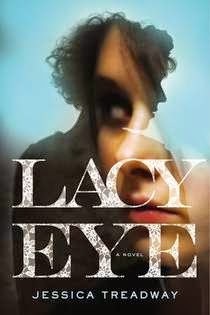
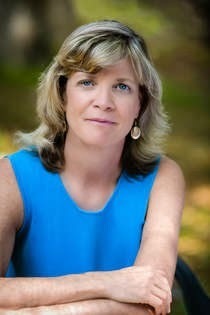
One of my favorite novel questions ever is this: How well do we know the ones we love? In Jessica Treadway's thrilling new novel Lacy Eye, she explores a terrifying scenario. A home invasion leaves a woman disfigured, and her daughter's boyfriend is convicted of the crime. But did he do it? And did her daughter play a role? Elizabeth Graver calls Lacy Eye"Gripping and emotionally complex." Publishers Weekly raves that the novel is a "deftly plotted psychological thriller… a devastating portrait of a family torn apart from both the outside and within."
Jessica's story collection Please Come Back To Me received the Flannery O'Connor Award For Short Fiction. Her other books are Absent Without Leave, a collection of stories and And Give You Peace, a novel. Thank you so much for being here, Jessica!
Q. I always want to know what sparked a particular book. What was the question haunting you that drove you to write?
A. The novel is inspired by a crime that happened in my hometown in upstate New York, although I changed the basic circumstances. In that case, a college-age son was convicted of killing his father and trying to kill his mother; my narrator is the middle-aged mother of a daughter she has always worried about, without quite allowing herself to recognize how deep that worry was. The question that moved me to write was, What is it like to be in the mind of a person who knows one thing at the most fundamental level, but on every level closer to the surface – the surface closest to everyday thought -- manages to believe what she wants to believe, because it’s easier to accept? My guess is that many if not most if not all of us do this to some extent, but the dire nature of this particular life-and-death situation gave me a structure to explore the phenomenon at its essence.
Q. I can’t imagine anything more terrifying than the phrase “face the unsettling truth about her own daughter.” How well do you really think we know the ones we love? And how can we live our lives knowing that there are hidden sides to people?
A. I don’t believe it’s the case that we can’t know really know the people we love – who they are at their cores, what’s important to them, how they feel about us. I agree with you that that would be a terrible way to live. I do think that some people make a choice -- whether conscious or unconscious – to ignore, excuse, or refuse to see the truth, because it’s more palatable and because it serves their vision of the way they want things to be. I believe that this can be true of the way we see other people and the way we see ourselves. Like the daughter in my novel, who as a child persisted in telling people she had a “lacy eye” instead of a “lazy eye,” even after her initial mistake – what she heard the doctor say, because she wanted to hear it -- was corrected.
Q. Lacy Eye was plotted so tightly, and the tension was so ferocious, that I am filled with admiration. Did you know how the novel was going to end when you started? What surprised you about the book?
A. Thank you! I actually did write two opposite endings, although the one I ended up with is the one I favored from the outset. The one I let go of was creepier, perhaps, but to have used it would have made the mother/narrator an entirely different character from the one I ultimately wanted her to be.
I think the only thing that surprised me about the book came after I’d submitted it to my agent and editors, and I realized that they were viewing it as a kind of thriller. I don’t think of myself as writing thrillers; I enjoy reading good ones, but I wouldn’t know the first thing about writing one. I perceive this book to be more the portrayal of a character’s psychic journey -- the transformation she allows herself to undergo, and what she learns along the way.
Q. What kind of writer are you? Do you outline? Do you have rituals? Do you wait around for the pesky Muse?
A. I used to wait around for the Muse more when I was younger – when I had more time in front of me, when I wasn’t as aware as I am now that the time ahead is limited. Now I take a more workmanlike approach, setting a timer and working for defined amounts of time. Forty-minute intervals, multiple times a day. It allows me to work intensely with an end in sight, a chance to reboot and refresh before diving in again.
I also write in my head at night, either before sleep or in the middle of the night. My husband tells me I shouldn’t do it, but I say, I’m awake anyway, why not? What else should I think about? I might think in more general terms, about a plot or a character, or I might actually compose lines in my head that I then need to rehearse over and over so I remember them in the morning. I know I could get up and write them down, but I prefer my way. Rehearse the paragraph or phrase enough times and it’s like counting sheep – I fall asleep and have the bonus of notes or lines to record in the morning.
Q. What’s obsessing you now and why?
I’m working on a novel told from four third-person perspectives, which is a switch from the two I’ve written from a first-person, singular point of view.
Q. What question didn’t I ask that I should have?
A. Maybe the question about where my title came from. I had a lot of working titles, but none I was very happy with. One day I was typing and I typed “lacy eye” when I meant to write “lazy eye,” and my fingers moved to correct it but then I pulled them back from the keyboard and said out loud to myself, Wait a minute, wait a minute, wait a minute. I knew even before I could form the actual thought that I had accidentally (or maybe not accidentally?) hit upon not only a title, but a concept that would illustrate the theme of the whole book. Some people have loved the title and some have had a strong negative reaction, but I’m one of the ones who loves it because it seems so suited to what I was trying to portray in the book – the danger of seeing something as far pr
Published on March 03, 2015 13:38



